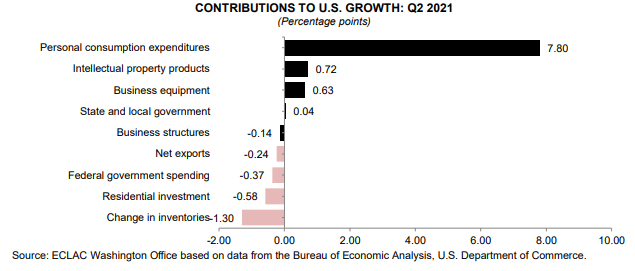Consumer spending boosts United States economy

The United States economy remained strong in the second quarter of 2021, driven by consumer spending, highlighted a report released by the Economic Commission for Latin America and the Caribbean (ECLAC).
With this, GDP grew at an annualized rate of 6.6%, enough to push the United States economy above its pre-pandemic level.
From another way of comparison, growth in the second quarter exceeded 6.3% in the first quarter, according to the second estimate from the Office of Economic Analysis, as fiscal stimulus continued to flow through the economy and the distribution of vaccines allowed lift more restrictions.

Overall, second-quarter growth was driven by strong consumer spending, which increased 11.9% and contributed 7.8% to growth for the quarter, as consumers benefited from federal stimulus funds.
Investment in intellectual property products, commercial equipment, and state and local government spending also contributed positively, while investment in commercial structures, net exports, federal government spending, residential investment, and inventories were subtracted from second-quarter growth. .
United States economy
As stimulus momentum fades, the report warns, the US economy may slow.
According to the Federal Reserve’s Beige Book, a report that collects anecdotal information from companies across the country, the economic recovery slowed and prices continued to rise over the summer as a resurgence of Covid-19 cases linked to the variant Delta led consumers to cut spending and supply chain problems persist, hampering businesses.
Therefore, a summer that was expected to return pre-pandemic activity has been disappointing.
Although the acceleration in inflation may be temporary, along with the jump in Covid-19 cases, it appears to be seriously affecting consumer confidence.
Driven by the rapidly spreading Delta variant and higher prices, the University of Michigan Consumer Sentiment Index suffered one of its biggest monthly losses in 40 years in August, falling to 70.3 (the lowest reading since 2011). from 81.2 in July.
The survey’s chief economist, Richard Curtin, said the drop also reflected «an emotional response, from frustrated hopes that the pandemic would soon end and lives could return to normal.»
Additionally, the Conference Board Consumer Confidence Index fell from a revised 125.1 (previously 129.1) in July to 113.8 in August, well below the pre-pandemic level of 132.6 recorded in February 2020.
![]()

